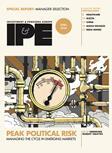The Pensionskasse Kirchliche Zusatzversorgungskasse des Verbandes der Diözesen Deutschlands (KZVK), a German provider of occupational pensions for employees in the Catholic Church and charitable services, has further expanded its investments in real assets, regionally and outside Europe.
According to its latest financial statement, KZVK invested a significant amount directly in infrastructure and real estate, particularly in renewable energy infrastructure in Europe. It also further increased holdings in private equity.
The statement showed that returns from capital investments reached €665.5m last year, up from €619.3m in 2018, including €3.6m from equity holdings and €22.6m from real estate investments. This was due to higher returns from investments but also from several disposals.
The book value of its investments also increased by €1.3bn last year, the document showed.
KZVK’s real estate portfolio invests 45.6% in three property funds focusing exclusively on the German market, worth €678m, and 54.4% in 18 European real estate funds worth €808m.
Additionally, the Pensionskasse acquired six real estate companies for the value of €90.5m.
For infrastructure, KZVK invests through two funds, which are worth a combined €64.9m.
KZVK also increased its allocation to emerging market equities and bonds while reducing investments in fixed income from developed countries, and it has, for the first time, started to allocate money to impact investments through a fund that refinances financial institutions in developing countries to grant microloans.
The COVID-19 pandemic has had a considerable impact on the valuation of KZVK’s investments. The fair value of its investments exceeded its book value by €3.8bn. By March 17, however, the value of these hidden assets had decreased by 36.4%, according to the financial statement.
Its assets totalled €29.2bn in 2019, capital investments stood at €21.2bn and actuarial reserves reached €28.8bn last year, with a funding level of 74%. It has more than 1.3 million insured, and 5,400 employers are part of its scheme.












No comments yet